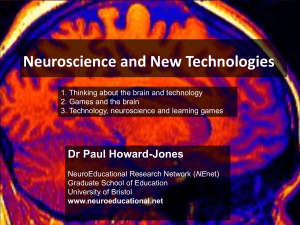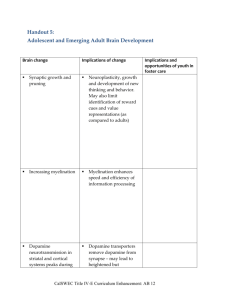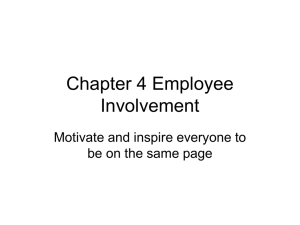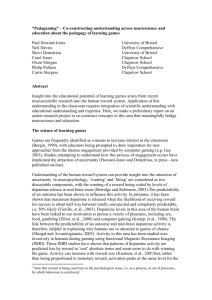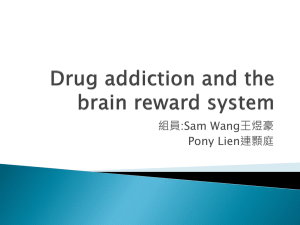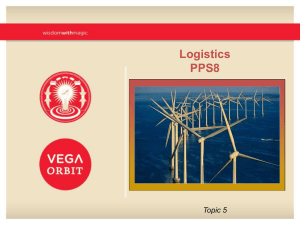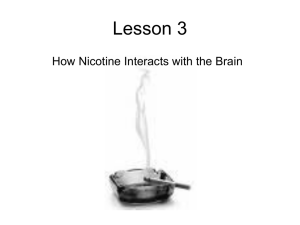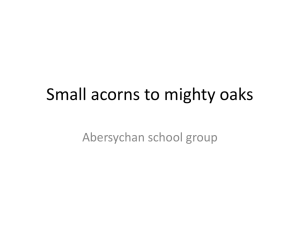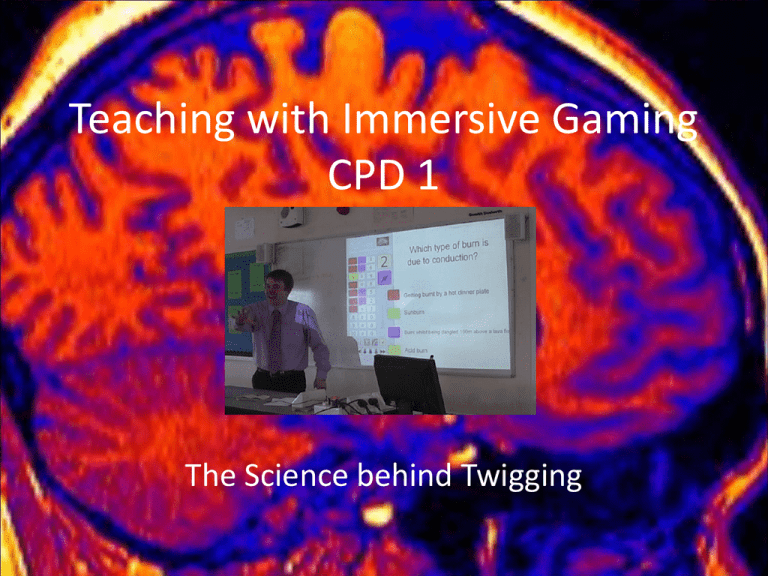
Teaching with Immersive Gaming
CPD 1
The Science behind Twigging
Aims of the Session
Understand:
• The science and principles behind Teaching
with Immersive Gaming
Why is emotional engagement important?
• Emotion & memory circuits closely linked
• The different ways in which emotion may
improve memory efficiency (or decrease it)
are still the subject of research.
But we know that the response of the
brain to reward can influence memory
Reward increases uptake of midbrain dopamine in the Nucleus Accumbens (NAcc)
Nucleus
accumbens (NAcc)
Activity here is linked to what psychologists call “approach motivation”
Of course, “Educational motivation” not always equal to approach motivation
E.g. “Educational motivation” can include a desire for professional progress. The DA
pathway is about a more visceral type of motivation – as in desire for sex,
chocolate cake, money and short-term winnings.
This visceral type of brain response to reward
predicts declarative memory formation
We do not understand the processes by which reward and declarative memory
formation are related. They may involve:
* direct influence on the hippocampus via dopamine (Adcock, 2006). Higher
NAcc activation during encoding = greater likelihood of recall
* increased attention, and so increased contextual memory
R. A. Adcock, Neuron 50, 507 (2006)
Students appear to engage more
emotionally with games than with their
lessons
Why are games so engaging?
• Perhaps they enjoy the uncertainty of winning or
losing?
• Does uncertainty increase the effect of a reward?
So…..
• If we understand what makes the brain’s
reward system respond, then we know when
we have a “teachable” moment….
When reward is 50:50 uncertain, it generates maximum
dopamine in the reward system:
Dopamine in response to visual stimuli were measured in the primate
brain. Some patterns, due to previous training, suggested a 100%
likelihood, no chance (0%) and 50 % likelihood of receiving a reward a
few seconds later. The graphs represent the dopamine response
recorded between the stimulus and receiving a reward:
The data suggests that 50% likely rewards generate more dopamine than
either totally unexpected or totally predictable rewards.
C. D. Fiorillo, P. N. Tobler, W. Schultz, Science 299, 1898 (2003).
So what about humans?
• Yes, we do most enjoy 50:50 chances in games but not in
school, where one study has shown children prefer risks of
~87%
M. M. Clifford, British Journal of Educational Psychology 58, 15 (1988).
• Why? Because intellectual failure has implications for esteem
• This preference may create a problem for emotional
engagement:
At levels of uncertainty that are socially comfortable, children may
experience reduced signals (linked to motivation) in the reward system,
missing the emotional response that unexpected success provides.
This suggests:
• a “learning games approach” in which gaming elements
increase uncertainty but with less penalties for esteem
Do children prefer increased chance-based
uncertainty of reward in a learning task?
First bridging study:
Task: Ask your maths question from
* Mr Certain (Correct -> 1 point)
* Mr Uncertain (Correct -> coin toss, 2 or 0 pts
Percentage of questions requested
from Mr Uncertain
80
70
60
50
40
30
1
6
11
16
21
26
Question number
As the session progressed, Mr Uncertain was increasingly more
popular than Mr Certain – especially amongst boys
P. A. Howard-Jones, S. Demetriou, Instructional Science 37, 519 (2009).
Why boys?
Males exhibit greater activation and functional connectivity in the
reward system when playing computer games (Hoeft, 2008)
This may be due to ovarian
hormones feminising the
reward system at the onset of
puberty (Becker, 2009). The
appeal of uncertain reward
appears stronger in males.
Becker, J. B. (2009). Sexual differentiation of motivation: A novel mechanism? [Review]. Hormones and
Behavior, 55(5), 646-654.
Hoeft, F., Watson, C. L., Kesler, S. R., Bettinger, K. E., & Reiss, A. L. (2008). Gender differences in the
mesocorticolimbic system during computer game-play. Journal of Psychiatric Research, 42, 253-258.
How does chance-based uncertainty influence
classroom discourse?
Second Bridging study:
– “Wipe Out” – try to beat the computer at a quiz
(Science, 13-14 yrs, low ability)
Roll the dice and, if you answer the question correctly, win the points and you can roll again – or
pass to the computer.
BUT: If you roll a “1”, you lose all the points for your turn, two “1”’s and lose all the points for the
game
If you answer incorrectly, the correct answer will be shown - remember it for next time!
Misfortune was bad luck and
discussed in gaming terms:
“agh! - we got obliterated.
Completely annoying, we
haven’t had any good rolls”
Success celebrated vigorously as
a triumph of ability:
“We’re just too good - I can’t
believe we’re doing
good” (+ singing & dancing):
Just a superficial effect?
Can chance-based uncertainty change the
emotional experience of the learning?
Or is it just a sugar coating?
Lab experiment: Adults play “Wipeout” (with
and without game element) while skin
response is measured
Skin conductivity changes (as a measure of emotional response) are
greater for answering questions as part of a game
P. A. Howard-Jones, S. Demetriou, Instructional Science 37, 519 (2009).
Can predicting dopamine help predict
learning?
• Neurocomputational models for some types
of game exist that allow us to estimate the
amount of dopamine at particular points in
the game. This estimate can be used to predict
learning performance…..
Pick a box (in which points vary like natural food
sources) and answer the question to win the points
Adult participants learnt as they played:
Estimated Brain Response
Brain response to the points found in the boxes
predicted learning performance
but the stakes (i.e. points available) did not)
Howard-Jones, P. A., Demetriou, S., Bogacz, R., Yoo, J. H., & Leonards, U. (2011). Toward a science of learning
games. Mind, Brain and Education, 5(1), 33-41.
For the classroom: We need to know more about
dopamine in competitive games
Competitor’s losses
activate the brain
Striatal dopamine from players’ unexpected
winnings and competitor’s unexpected losses
Dopamine in response to the competitor’s unexpected
losses may inhibit imitation which, judging by mirror
neuron activity, begins prior to outcome
P. A. Howard-Jones, R. Bogacz, J. H. Yoo et al., Neuroimage 53, 790 (2010).
We are now using these ideas to explore how to
use games and improve emotional engagement in
the classroom
Teach With Immersive Gaming (twig)
0
0
2
0
0
3
0
0
4
0
0
5
0
2
6
0
0
7
0
0
8
0
0
9
0
0
10
0
0
1
Question?
~
Option 1
Beta version
1
Option 2
Option 3
P
Option 4
TWIG – the practice:
TWIG practice exploits the ramping up of dopamine in
response to uncertain reward in learning games.
1
~
• Design of questions - test all learning levels
• When presenting the questions, support and
scaffold students (e.g. remind of principles
involved, q and a)
• When revealing the correct answer, explain why
other answer options are incorrect before (usually)
explaining the correct one
• referring to options by content not colour
• Be ready for your teacher persona to transform...
P
1
0
0
2
0
0
3
0
0
4
0
0
5
0
0
6
0
0
7
0
0
8
0
0
9
0
0
0
0
0

